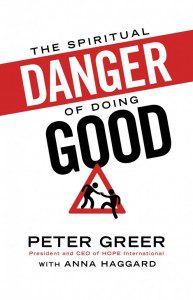My recent interview continues with Peter Greer. Peter is president and CEO of HOPE International, a global nonprofit focused on Christ-centered job creation, savings mobilization, and financial training. He is also the author of the new book The Spiritual Danger of Doing Good
. You can hear Peter speaking in a lab session at the Catalyst conference in Atlanta October 2-4, 2013.
 Bill: Your chapter on Jesus as that 3 AM friend and your own candid sharing of shortcomings in that area of accountability was a very good one. But we all know that we need this accountability. What I’ve seen is that it seems to be hard to find others who are willing to go there to ask those tough questions. How do we go about fostering that culture? How do we go about letting people know that we’re open to that authentic accountability? And then any ideas for how we intentionally create that culture or call people to it?
Bill: Your chapter on Jesus as that 3 AM friend and your own candid sharing of shortcomings in that area of accountability was a very good one. But we all know that we need this accountability. What I’ve seen is that it seems to be hard to find others who are willing to go there to ask those tough questions. How do we go about fostering that culture? How do we go about letting people know that we’re open to that authentic accountability? And then any ideas for how we intentionally create that culture or call people to it?
Peter: I used to think that extending the invitation was enough, that if I extended the invitation and said, “Bill, please let me know if you see things in my life that are not going to lead to long-term health. Please tell me when you see those.” I thought that was enough. But I no longer believe that because you can extend that invitation and chances are that no one will ever act on that. Everyone has enough of their own issues that they’re dealing with. Why in the world would we deal with someone else’s?
I think that there is a different way. It requires that invitation first but then it requires me to go beyond the original invitation and to pick up the phone and say, “You know what? I’m struggling in this area.” It requires less responsibility on others and more responsibility on myself to foster deep friendships.
Every Friday morning in my own life, I get together with two guys through the phone. I truly love these two men, and we practice this accountability. I can say that it does not happen quickly; it requires someone to go first. But it’s amazing what happens when you have someone who’s willing to go first. It provides an invitation to the others to be real when chances are they have similar struggles.
Bill: As you say that, I’m thinking that going first is, in itself, an act of faith isn’t it? If we’re doing it because we believe that this is what God has called us to do, we’re stepping out by faith and leaving the outcome in His hands. Essentially you’re saying that inviting accountability isn’t enough. We can’t ask people to say, “Trust me, I’ll be okay with your asking questions.” We have to prove that we can be trusted by first of all sharing where we’re struggling, thereby letting them know it’s okay to go there.
Here’s a question that I was pondering today as I thought about your chapter on identity and getting your identity wrapped up in what you do. How do you know if who you are is being defined by what you do? Because usually, when we’re in the middle of that, it is very difficult for us to see it. Especially when you’re doing something that everybody agrees is very good and obviously doing good for the Kingdom. How do you know internally? What are some of the indicators that we should look for tp know that our identity is getting too wrapped up in what we do rather than who we are?
Peter: I don’t think the question is if our identity is wrapped up in what we do. I think the question is how much of our identity is wrapped up in what we do. I don’t know that there is a simple checklist or self-evaluation to go through on that. The easiest way to know is to do what you just did, [ See Stepping Away from a Life of Comfort ] to make the leap and to think about in that process, “Can you define yourself without answering the question of what you do?” Maybe that’s one.
I think another helpful piece short of that is to listen to yourself when you’re meeting new people. When you meet someone, do you always lead with “Hello, my name is Peter Greer, and I work for HOPE International.” Is there more to it than that? Not that you go to the extreme and never talk about what you do, but do you really believe that you have an identity apart from the work that you do? And would it be impossible for you to think about having another position in a different space?
Like, for you, Bill, if you felt that for whatever reason this was the time for you to go work for Coca-Cola and to write there, would you feel embarrassed to tell your family and friends that know you about no longer being a full-time ministry leader, or would you still have that sense that what I do is just a new environment for me to live out my calling as a follower of Jesus? Or can you even entertain the idea of doing something outside of whatever it is that defines you?
Bill: Do I have to answer that?
Peter: You don’t, as long as I don’t, either.
Bill: That’s a question that I wrestled with, believe me, long and hard, and even as you say that, I realize that it’s an ongoing question. It’s not that you answer it once and you’re done. It’s a process that you must continually re-engage, and I love how you put that point about how we introduce ourselves. I did experience that many times when I would meet people and the first question was always, “What do you do?” During the season of transition I often said, “Well, you know, this is where my heart is, this is the direction I’m headed early on in this process of walking by faith.” They often didn’t know quite what to do with that. The conversation just kind of died.
Peter: Wouldn’t it be great though if the default first question after the name was not, “What do you do?” What if we asked:“Who are the most important people in your life?” or “What really brings you joy right now?” Just some crazy question that tries to pry our fingers off our tightly-clenched assumption that what we do defines who we are?
Bill: You make a good point in your book [ The Spiritual Danger of Doing Good ] about the danger of our just giving leftovers to our loved ones, but is there a point where you can invest too much time in your family and neglect other areas in the Kingdom that God has called you to? I’ve known people who really withdraw quite a bit from culture and other things in order to focus on family. Frankly, over the long-term I haven’t seen that it’s been all that productive for their family. Are there ways you have found personally to get that Biblical balance?
Peter: We have an incredible ability to take any good thing and, as Tim Keller says, make it an ultimate thing. In so doing, we turn that good thing into our own god — something that we can’t imagine life without. If our sense of identity and purpose and meaning is all about our kids or all about our spouse or all about thinking about our grandkids, that is taking a very good thing and taking it too far. So, everyone has this natural inclination, right, to either turn their family into a god or to practice the age-old art of child sacrifice and neglect those closest to you in pursuit of your own ambition.
In my mind, that chapter was written because I see that more often those in ministry who believe in what they’re doing, who are passionate about what they’re doing, forget that part of their ministry is loving family. It’s great that they’re going all around the world, but part of what I believe we’re called to is to say “How would those closest to us describe our life and our love?”
Yes, you can take it too far on either side. Our families are not meant to be our gods, nor are they meant to be just another piece of what we do. That is the tension that we face and perhaps the healthy question to ask our spouse, if we’re married, is, “Apart from Christ, do you believe that you are my highest priority above my vocation?” I mean, that to me is coming from the idea of that passage, “Husbands, love your wives just as Christ loved the church and gave Himself up for her.” Are we really exhibiting that sort of love to those that are closest to us?
Bill: Good thoughts, Peter. I really appreciate it. Thanks for your time and your efforts in sharing a vital message in your book The Spiritual Danger of Doing Good.
See you at Catalyst! You may also enjoy this interview with Brad Lomenick: “The Catalyst Leader and Calling.”
Share your thoughts on our conversation with a comment below.












